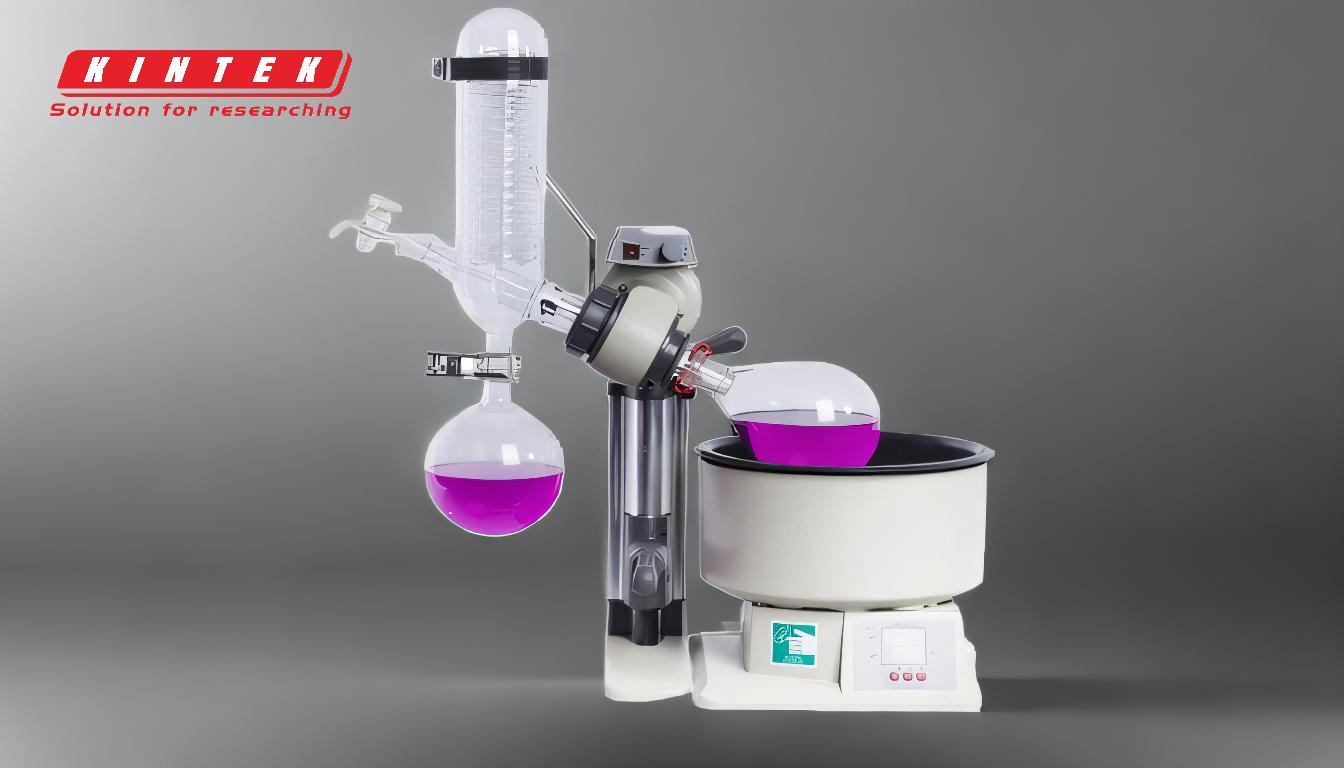A rotary evaporator is a highly efficient and versatile tool widely used in laboratory settings for solvent removal, concentration, and distillation. Its advantages include faster processing times, reduced risk of thermal degradation, and energy efficiency compared to traditional methods. By operating under reduced pressure and at controlled temperatures, it ensures gentle and effective evaporation, making it ideal for heat-sensitive materials. Additionally, it enables solvent recovery, reduces waste, and provides precise control over the process, making it indispensable in pharmaceuticals, biotechnology, and chemical research.
Key Points Explained:

-
Faster Processing Times:
- Rotary evaporators significantly reduce the time required for solvent removal, often completing the process in less than 5 minutes.
- This speed is achieved by creating a thin film of the liquid on the inner wall of the flask, which maximizes the surface area for evaporation.
- The ability to drip-feed solutions into the flask allows for continuous operation without interruptions, further enhancing efficiency.
-
Low-Temperature Operation:
- By operating under reduced pressure, rotary evaporators lower the boiling point of solvents, enabling evaporation at much lower temperatures.
- This feature is critical for protecting heat-sensitive solutes, such as proteins, enzymes, and other biomolecules, from thermal degradation.
- It also minimizes the risk of unwanted chemical reactions or decomposition during the process.
-
Energy Efficiency:
- Rotary evaporators consume less energy compared to traditional boiling methods, as they rely on vacuum pressure rather than high heat.
- The reduced energy requirement makes them a cost-effective and environmentally friendly option for solvent removal.
-
Gentle and Controlled Evaporation:
- The consistent distribution of the substance mixture on the inner wall of the flask ensures gentle evaporation, preserving the integrity of the sample.
- Users can precisely control vacuum depth, temperature, and rotation speed, allowing for tailored outcomes and consistent results.
-
Solvent Recovery and Waste Reduction:
- Rotary evaporators enable the recovery and recycling of solvents, reducing waste and lowering operational costs.
- This feature is particularly beneficial in industries where solvents are expensive or hazardous, such as pharmaceuticals and chemical manufacturing.
-
Versatility Across Applications:
- Rotary evaporators are suitable for processing a wide range of materials, including organic, inorganic, and polymeric compounds.
- They are widely used in pharmaceuticals, biotechnology, and chemical research for applications such as solvent extraction, distillation, and concentration.
-
Scalability:
- Rotary evaporators are effective on both laboratory and pilot scales, making them adaptable for small-scale research and larger industrial applications.
- Their ability to handle large quantities of solvents with low boiling points ensures consistent performance across different scales.
-
Efficient Removal of Residual Solvents:
- The combination of reduced pressure and controlled temperature ensures the efficient removal of residual solvents, which is crucial for achieving high-purity products.
- This capability is particularly important in the production of pharmaceuticals and fine chemicals, where even trace amounts of solvents can compromise product quality.
In summary, the rotary evaporator is a powerful and versatile tool that offers numerous advantages, including faster processing, gentle evaporation, energy efficiency, and precise control. Its ability to handle heat-sensitive materials, recover solvents, and scale across applications makes it an essential instrument in modern laboratory and industrial settings.
Summary Table:
| Advantage | Description |
|---|---|
| Faster Processing Times | Completes solvent removal in <5 minutes, maximizing surface area for evaporation. |
| Low-Temperature Operation | Protects heat-sensitive materials by lowering boiling points under reduced pressure. |
| Energy Efficiency | Consumes less energy compared to traditional boiling methods. |
| Gentle and Controlled Evaporation | Ensures sample integrity with precise control over vacuum, temperature, and rotation. |
| Solvent Recovery | Enables solvent recycling, reducing waste and operational costs. |
| Versatility | Suitable for organic, inorganic, and polymeric compounds across various industries. |
| Scalability | Effective for both lab and industrial-scale applications. |
| Residual Solvent Removal | Ensures high-purity products by efficiently removing trace solvents. |
Ready to enhance your lab's efficiency? Contact us today to learn more about rotary evaporators!









